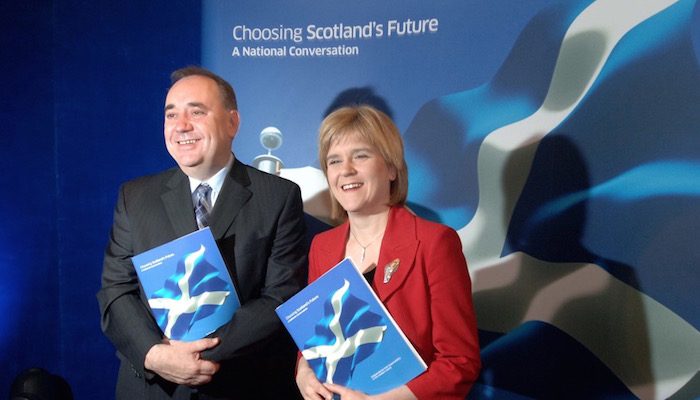
This is the first of two posts based on a round-table debate held at Bristol UWE on the future of the UK after the Scottish ‘No’ vote in the independence referendum of September 2014. The debate was chaired by Phil Cole and Stephen McGlinchey who addressed the issues from two positions – the domestic implications (Cole – published below) and the international implications (McGlinchey – which follows in Part two). The debate was arranged as an expansion of Cole and McGlinchey’s article on Scottish independence published by The National Interest in the days after the No vote.
—
In the run up to the vote in the Scottish Referendum the leaders of the main Westminster parties made strong promises about extra powers for Scotland in order to protect what seemed to be a crumbling ‘No’ vote. It may be that those promises swung the vote their way or they may have been panicked by a rogue poll.
Now the task is to work out what those promises actually amount to. That is the job of the Smith Commission set up by David Cameron under the leadership of Lord Smith of Kelvin. The Commission will draw up an outline agreement on proposals by the end of November and draft legislation will be drawn up by the end of January 2015.
What we know is that all the political parties have different views on what ‘Devo-Max’ or ‘Independence-lite’ will look like for Scotland and what it means for the rest of the United Kingdom. The arguments about what it means for Scotland revolve around tax and welfare, with Labour being least generous over what it wants to cede to the Scottish Parliament, the Conservatives and Liberal Democrats being more generous, and the Scottish National Party wanting more still.
But it is what it means for the rest of the UK that has caused the greatest fall out, with David Cameron stitching the devolution issue with the West Lothian question of English Votes for English Laws, or EVEL as it has become known, and wanting this settled before the 2015 General Election.
The Smith Commission will not look at this but William Hague is chairing a Cabinet Committee on Devolved Powers. Labour has boycotted the committee because of what it sees as a commitment to some form of EVEL which it wants to avoid at all costs. Hague has said that if the main parties cannot agree then proposals will go before the House of Commons by the end of November.
We also have the House of Commons Political and Constitutional Reform Committee. which was set up in June 2010 to look at constitutional issues, and which is currently taking evidence on the question of devolution. Some interesting views are coming out of that committee. Not least there’s the view of many Tory MPs voiced by Chris Chope, that the devolution vows made by party leaders before the Referendum did not have Parliamentary approval and so shouldn’t be taken too seriously. And the Committee chair, Graham Allan, a Labour MP, warned of a feeling that the Smith Commission should even be suspended.
The evidence presented to that committee by academics so far has stressed that the timetable is not realistic. Nicola McEwen of the Scottish Centre on Constitutional Change told the committee that with a General Election coming the timetable wouldn’t be changed, but she said “I suspect that means whatever comes out is probably not going to be sustainable and we will be back here within a few years talking about either fixing that or ‘what next’?”
Michael Keating, from the same research centre, told the committee that while constitutional change never happens for rational reasons, “Nevertheless, you can move too rapidly for short-term political considerations and end up making your problem worse because you have created a system which is just not going to work.”
But what do the voting public want? The evidence is that they do have an appetite for change. When polled, the status quo comes out as the least popular option, and EVEL comes out as the most popular option, so it looks as though Labour’s attempt to duck the West Lothian question isn’t going to wash with the public and they may have to think again and quickly if they are not going to be damaged by this in the General Election.
The end result is unpredictable, which is very exciting for commentators, but while the public may have an appetite for change they may not have much appetite for unpredictability. That makes the whole process a minefield for the political parties running up to the General Election.
Further Reading on E-International Relations
- Opinion – Scottish Foreign Policy in the Brexit Era
- Opinion – Sturgeon’s Departure and the Conundrum of Scottish Independence
- Opinion – Scotland: Host of COP26 but Divided on Its Role in the World
- We Unhappy Few: The Conservative Party Leadership Race
- Opinion – Brexit and Its Many Identities in the UK
- Brexit Endgame: The 2019 UK Election